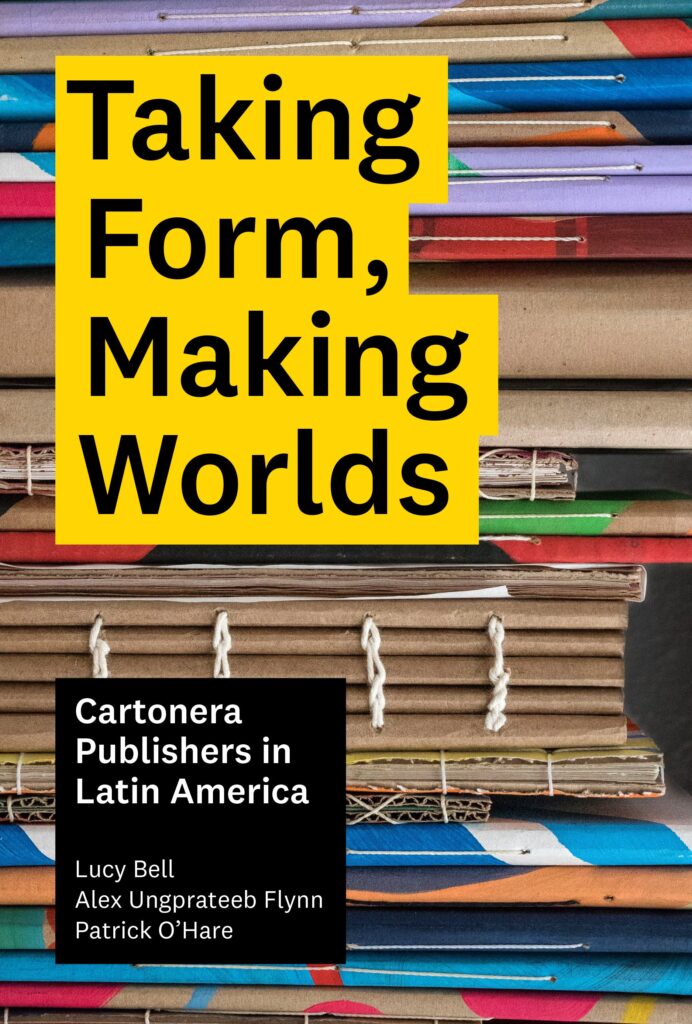In this joyful and comprehensive study, Lucy Bell, Alex Ungprateeb Flynn, and Patrick O’Hare immerse readers in the colourful world of cartonera, a publishing phenomenon that has swept across Latin America over the past two decades.
What is cartonera publishing?
Cartonera is a publishing venture and artistic practice that emerged in Argentina in 2003 in the wake of the 2001 economic crisis. With job security worsening, many people took jobs as cartoneros where they would collect and sell salvaged materials to recycling plants. At the same time, publishing houses were struggling, and some people in the industry were looking for a way to make literature cheaper and more accessible. Against this backdrop, Eloísa Cartonera – the first cartonera collective – was born.
The premise was simple. Eloísa would buy cardboard from the cartoneros at a higher rate than other recycling plants, and the cardboard would be painted, decorated, glued and bound to produce a book cover. Since then, the cartonera movement has exploded across Latin America and beyond, expanding beyond the original circumstances in which it was created to form a vibrant and ever-evolving practice.
A study of cartonera
Taking Form, Making Worlds is the first comprehensive study of cartonera. Based on extensive fieldwork and research conducted over the course of four years, Bell, Flynn, and O’Hare immerse themselves in the world of cartonera, going beyond the role of researchers to become practitioners, exhibitors, curators, and activists in their own right.
Split into six chapters, the first few chapters engage with cartonera in a more theoretical sense, fleshing out the humble beginnings of the phenomenon in Argentina, before laying out the methodological framework of their research. The final few chapters work through the more practical and material aspects of cartonera, including encounter, workshops, and exhibition. With the three authors coming from different academic backgrounds (including literary, anthropological, and artistic), they adopt an interdisciplinary approach, seeking to reflect cartonera’s collaborative spirit of exchange through their own collaboration on the book. While the book can be quite theory-heavy, the ever-present voices and stories from inside the cartonera cooperatives keep it engaging and fluid.
Taking Form, Making Worlds draws primarily from the work of four cartonera collectives based in Brazil and Mexico. Dulcinéia Catadora, which was the first collective to be launched in Brazil in 2007 and operates from a recycling cooperative in São Paulo; Catapoesia which was set up in Minas Gerais to promote literacy, working with quilombos and rural communities to create books that reflect oral tradition; La Cartonera in Cuernavaca, the first cartonera set up in Mexico, who specialize in bilingual editions and minority languages; and La Rueda in Guadalajara, a community-based collective and café that aims to ‘oppose government cultural policy and resist the homogenizing ideology and (dis)information propagated by public institutions and the mass media’ (Sergio Fong, 2018).
The book is packed with examples of the ways in which different groups – including imprisoned women, Indigenous people, rural communities, waste-pickers, and more – use cartonera to amplify their voices, foster solidarity and community, and oppose state infrastructure.
Cartonera in a women’s prison
Notably, the Guadalajara-based collective La Rueda have set up a cartonera workshop program in a women’s prison called Puente Grande in Jalisco. The women who partake in the workshops are able to reduce their sentences by getting involved. Many of these women have directly suffered at the hands of the State. These cartonera workshops give women the creative licence to speak back against the sexist, patriarchal, and colonial system which has put many of them in prison in the first place. Griselda, one of the women who participated in the workshops in Jalisco, tells the authors how these workshops have helped: ‘The book Wind and Mirrors has been a journey, like winning a place on a cruise that allows me to travel far beyond the walls of this prison. I now know I can express myself and denounce injustices through literature.’
As the imprisoned women in Puente Grande are empowered by these cartonera workshops, rural communities in Minas Gerais work with Catapoesia to create cartoneras that resist extractivism and disseminate alternative ways of knowing, being and relating to the natural world. Working with some of the region’s most marginalized and isolated communities, Sol, one of the publisher’s founders, says: ‘Our writings are intrinsically related to our work in communities. Catapoesia, from the beginning, decided to write collective texts because they benefit from the words of all participants, even those who don’t like to write.’
Bell, Flynn, and O’Hare’s research shows that above all, cartonera collectives are inherently social, and firmly embedded in their respective communities.
The means rather than the ends
Time and time again, Bell, Flynn, and O’Hare’s research shows that above all, cartonera collectives are inherently social, and firmly embedded in their respective communities. They are grassroots, non-hierarchical, often decolonial, and challenge the existing hierarchies in the publishing world and within the confines of contemporary gallery spaces. The authors state: ‘cartonera creates a space between visual art and literary narrative for people to tell their own stories by making their own books.’
One of the most striking things about the book is that the authors do not seek to define cartonera as an art object. Rather, they attempt to unravel the practice of cartonera itself. Bell, Flynn, and O’Hare argue that ‘the focus of the project is always on the means rather than the ends’, that separating the ‘final product’ of the cartonera from the workshops and the material act of making erases the importance of the practice itself. The value of cartonera does not necessarily lie in the art object itself, rather it lies in the process of encounter and exchange involved in its making. Indeed, when LAB sat down to chat with co-author Alex Ungprateeb, he suggested that ‘cartonera is unpredictable. To try and pin it down to one thing would not be true to what the cartonera practitioners are doing across the continent.’ It is a fluid and ever-evolving movement that everyone approaches differently.
Cartonera creates a space between visual art and literary narrative for people to tell their own stories by making their own books.
Flynn hopes that Taking Form, Making Worlds will encourage people to take art more seriously. He asserts that ‘art has the power not just to illustrate things, but to generate theory and effect change.’ The concluding chapter of the book describes the London Cartonera Book Festival in 2019 and seems an apt way to finish the study. Taking their research beyond the borders of Latin America, the festival gave the authors the opportunity to reflect on how cartonera has affected their research and work moving forward, as well as giving some of the cartonera collectives the opportunity to share their work and connect with other artistic communities.
The final words of the book summarize both cartonera itself and the author’s approach to their study: ‘Stubbornly community based, joyfully collective, and irreverently autonomous.’



